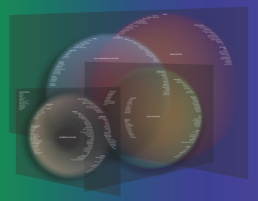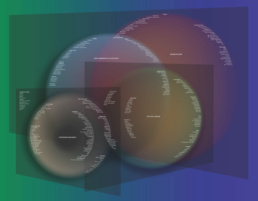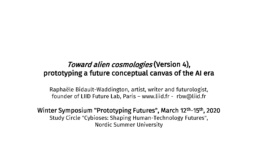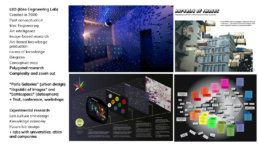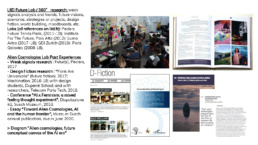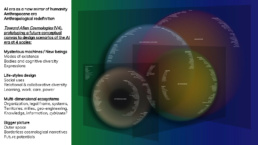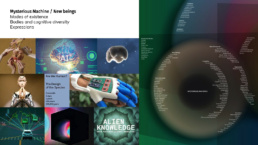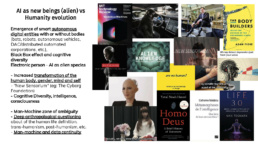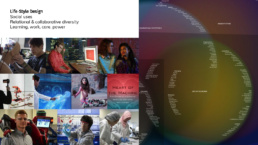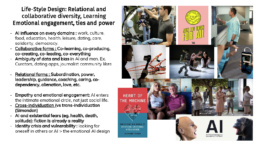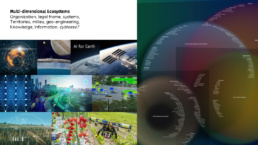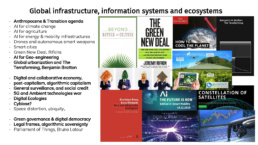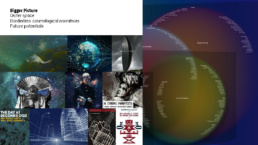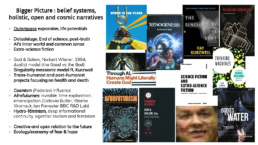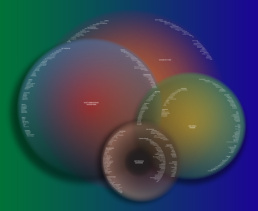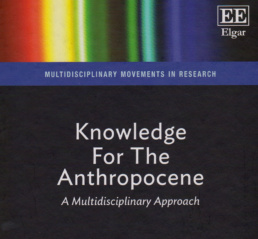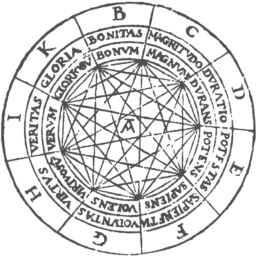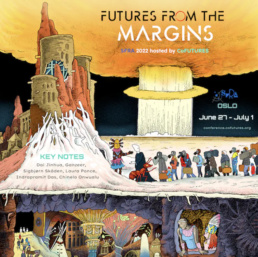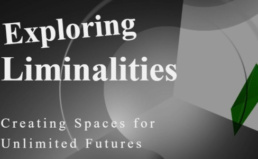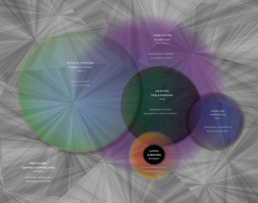Symposium 'Prototyping Futures', Cercle 'Cybiosis', NSU, Diffrakt, Berlin, 2020
Toward Alien Cosmologies
Prototyping a future conceptual canvas of the AI era
Symposium ‘Prototyping Futures’, Nordic Summer University, Study circle « Cybiosis : Shaping Human-Technology Futures », at Diffrakt – Centre for Theoretical Periphery, Berlin, 2020.
Tirant des conclusions des travaux précédents sur les enjeux prospectifs de l’IA et sur l’ampleur de son impact sur le monde, ce rendez-vous est l’occasion de prototyper et mettre en discussion avec un cercle de recherche artistique et hybride, un premier canevas conceptuel servant d’outil possible pour structurer une perspective d’avenir.-
Ce premier diagramme sert en premier lieu à positionner et ordonner des thèmes prospectifs de manière très fluide, exploratoire et sans objectif spécifique. Il comprend à ce stade 4 sphères soit 4 dimensions du monde : Mysterious Machines (êtres humains et non-humains), Life-Style Design (Modes de vies et usages), Multi-dimensional Ecosystems (Systèmes et planète), et Bigger Pictures (Visions du monde).
Abstract
Toward alien cosmologies is an exploratory and incomplete conceptual canvas we started to model in 2017 in the frame of a research on the societal impacts of AI (commissioned by a future research agency), using a « weak signals » prospective methodology. AI is touching on and distorting every facets and dimensions of our existences, from the most intimate sphere to the society, the city, the economy, the law and even the planet and the space. It has become an ambiguous mirror of the human condition and of all of our uncertainties at each of theses scales.
In this new paradigm, the human is as alien as the AI, and both need new world visions (cosmologies). Toward alien cosmologies is an investigation to design new, humble and approximating anthropological futures in the AI era, using a creative and hybrid method that allows to bridge knowledge disciplines and social practices. For the symposium, we offer to briefly share the past research steps and continue the process of designing the alien cosmologies future research framework.
The live presentation will be an occasion to test and discuss with the audience its latest prototype, taking the shape of a large scale conceptual diagram, and mapping the future speculative panorama.
Following the first research step, we tested in 2018-19 with design students (Duperré School) and engineering researchers (Telecom Paris Tech), a series of (incomplete) design fiction experiments to prototype possible futures situations via indirect creative and critical experiences that still give a concrete sense of their materialization and allow to appreciating their multidimensional impacts. This prototyping method allows a concern for the broader societal and symbolic dimensions, is an alternative to pragmatic « solutionist » or object-based prototypes, and offer new possibilities to prototype at the large scale (eg. organizations, cities, worlds) or in the conceptual realm (as we do).
These experiments dialog with more theoretical and multi-disciplinary investigations to be shared in conferences such as at Susch Muzeum (Switzerland) and a long essay in the museum annual publication due soon. As in the diagram, classic theories (philosophy, anthropology, ecology, digital humanities) entangle with more fringe fields (afro-futurism, hydro-feminism, dataism).
RBW
Slides de l'intervention
A propos de "Prototyping Futures", Nordic Summer University Winter Symposium
Symposium organised by NSU Study Circle #2: Cybioses – Shaping Human-Technology Futures
SCIENTIFIC / ORGANIZATION TEAM : Palle Dahlstedt, Rafael Dernbach and Maru Mushtrieva
In our previous symposia, we have examined improvisation, creativity, and projection as key practices of shaping futures: when is improvisation required in making or imagining futures? Can creativity be automated? And how can projecting into the future prevent us from repeating and prolonging what already exists today?
For our fourth symposium, we want to examine the practice of prototyping. Building a prototype means creating an incomplete sample or model to test an idea. Prototyping usually has two features: firstly, it demonstrates the feasibility of an idea. Often this occurs by translating conceptual knowledge to experiential knowledge: what has worked in theory becomes visible and palpable and then hopefully works in practice as well.
And secondly, prototyping accelerates a production process. The incompleteness, small scale or limited functionality of a prototype allows for an accelerated test. Simply said, the quickest way to build something is to build something else.
About NSU Study Circle ‘Cybioses’ : www.nsuweb.org/study-circles/circle-2-cybioses-life-in-the-future-imperfect/
Rappel des axes de recherche du lab
Axe 1 : Transitions et Mondes Futurs
Axe 2 : Innovation Méthodologie Prospective
Axe 3 : Art et Recherche Prospective
Articles associés à celui-ci
Vers des Cosmologies Alien, topologie prospective d’une refondation…, FHAP#4, 2020
Cet article propose un grand parcours à travers les mouvements du monde et les défis prospectifs qu’ils soulèvent dans…
Designing Post-Human Futures, Knowledge for the Anthropocene, 2021
Ce long essai est une première ébauche des intentions méthodologiques du TAC Future Lab convoquant notamment la pensée…
Ethics & Philosophy of Futures, Association of Professional Futurists, 2022
RBW présente les références philosophiques qui irriguent les travaux du TAC Future Lab, que ce soit dans ses dimensions…
The Future as a moving panorama, Sci-Fi Research Association, University of Oslo, 2022
La Science-Fiction suscite aujourd’hui un vif intérêt pour sa capacité à donner à sentir des mondes futurs, qu’ils…
TAC World-building, 25th World Future Studies Federation Conference, Paris, 2023
Cette conférence vient montrer comment le TAC Future Canvas a été conçu, est positionné en relation avec d’autres…
limit/no limit, Art & Design Research Conference, Paris, 2024
RBW reparcourt les enjeux liés à la connaissance du TAC Future Lab, que ce soit la valeur cognitive des formats…
